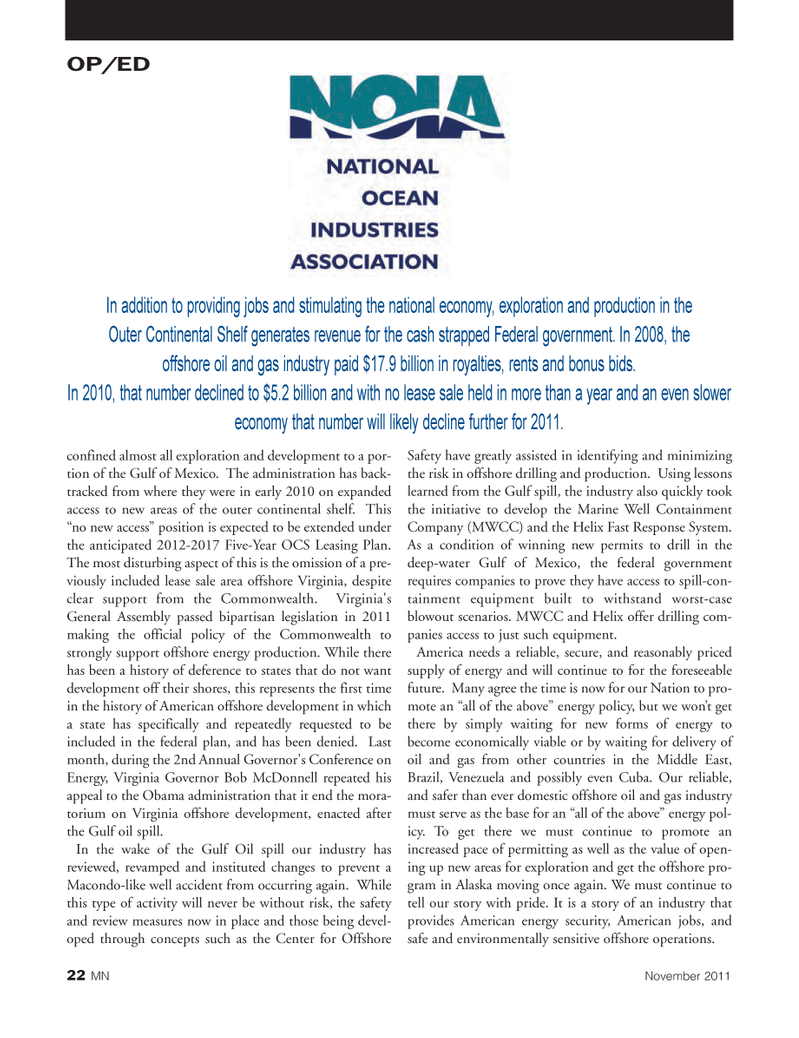
Page 22: of Marine News Magazine (November 2011)
Workboat Annual
Read this page in Pdf, Flash or Html5 edition of November 2011 Marine News Magazine
confined almost all exploration and development to a por- tion of the Gulf of Mexico. The administration has back- tracked from where they were in early 2010 on expanded access to new areas of the outer continental shelf. This ?no new access? position is expected to be extended under the anticipated 2012-2017 Five-Year OCS Leasing Plan. The most disturbing aspect of this is the omission of a pre- viously included lease sale area offshore Virginia, despite clear support from the Commonwealth. Virginia's General Assembly passed bipartisan legislation in 2011 making the official policy of the Commonwealth to strongly support offshore energy production. While there has been a history of deference to states that do not want development off their shores, this represents the first time in the history of American offshore development in which a state has specifically and repeatedly requested to be included in the federal plan, and has been denied. Lastmonth, during the 2nd Annual Governor's Conference on Energy, Virginia Governor Bob McDonnell repeated his appeal to the Obama administration that it end the mora- torium on Virginia offshore development, enacted after the Gulf oil spill. In the wake of the Gulf Oil spill our industry has reviewed, revamped and instituted changes to prevent a Macondo-like well accident from occurring again. While this type of activity will never be without risk, the safety and review measures now in place and those being devel- oped through concepts such as the Center for Offshore Safety have greatly assisted in identifying and minimizing the risk in offshore drilling and production. Using lessons learned from the Gulf spill, the industry also quickly took the initiative to develop the Marine Well Containment Company (MWCC) and the Helix Fast Response System. As a condition of winning new permits to drill in the deep-water Gulf of Mexico, the federal government requires companies to prove they have access to spill-con- tainment equipment built to withstand worst-caseblowout scenarios. MWCC and Helix offer drilling com- panies access to just such equipment. America needs a reliable, secure, and reasonably priced supply of energy and will continue to for the foreseeable future. Many agree the time is now for our Nation to pro- mote an ?all of the above? energy policy, but we won?t get there by simply waiting for new forms of energy to become economically viable or by waiting for delivery of oil and gas from other countries in the Middle East, Brazil, Venezuela and possibly even Cuba. Our reliable, and safer than ever domestic offshore oil and gas industry must serve as the base for an ?all of the above? energy pol- icy. To get there we must continue to promote an increased pace of permitting as well as the value of open- ing up new areas for exploration and get the offshore pro- gram in Alaska moving once again. We must continue to tell our story with pride. It is a story of an industry that provides American energy security, American jobs, and safe and environmentally sensitive offshore operations. 22MNNovember 2011In addition to providing jobs and stimulating the national economy, exploration and production in the Outer Continental Shelf generates revenue for the cash strapped Federal government. In 2008, the offshore oil and gas industry paid $17.9 billion in royalties, rents and bonus bids. In 2010, that number declined to $5.2 billion and with no lease sale held in more than a year and an even slower economy that number will likely decline further for 2011. OP/EDMN#11 (18-31):MN 2011 Layouts 10/27/2011 9:20 AM Page 22

 21
21

 23
23
